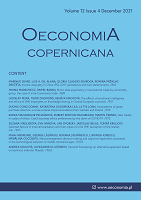Economic growth and labour market in the European Union: lessons from COVID-19
Economic growth and labour market in the European Union: lessons from COVID-19
Author(s): Andrej PřívaraSubject(s): Labor relations, Health and medicine and law, Economic development, EU-Accession / EU-DEvelopment
Published by: Instytut Badań Gospodarczych
Keywords: COVID-19; economic growth; pandemic; labour market; crisis;
Summary/Abstract: Research background: The world has been fighting the new pandemic caused by COVID-19 since March 2020. The subsequent restrictions on economic activity resulted in a supply shock, accompanied by a supply chain disruption, job layoffs, reduced work time and wages and decreased disposable incomes and taxes, which led to a demand shock. However, whether a close link exists between the number of confirmed cases, deaths and economic indicators during the COVID-19 pandemic remains uncertain. Purpose of the article: The current study aims to analyse the impact of the number of infections and deaths on economic growth and labour market indicators in the member states of the European Union. Methods: To achieve the main research goal, we conduct a panel data analysis on the quarterly data of 2020. Specifically, we developed three random-effects panel data econometric models to estimate the significance of infection and mortality rates for economic growth as well as employment and unemployment rates. Findings & value added: This study contributes to the existing literature by analysing the link between the infection and mortality rates of COVID-19 and selecting macro-economic indicators within the European Union. The results show that the infection rate is not a significant variable for economic growth and labour market indicators. However, an increase in the number of confirmed deaths has a significantly negative impact on the economy. Moreover, an increase in the mortality rate has a worse impact on the labour market than on economic growth in general. These results can serve as a theoretical basis for future research on the interconnections between pandemics and macro-economic indicators. The findings can also contribute to developing efficient policy instruments for mitigating the negative impact of pandemics in the future, thereby ensuring the cooperation of fiscal, monetary and health policy authorities.
Journal: Oeconomia Copernicana
- Issue Year: 13/2022
- Issue No: 2
- Page Range: 355-377
- Page Count: 23
- Language: English

